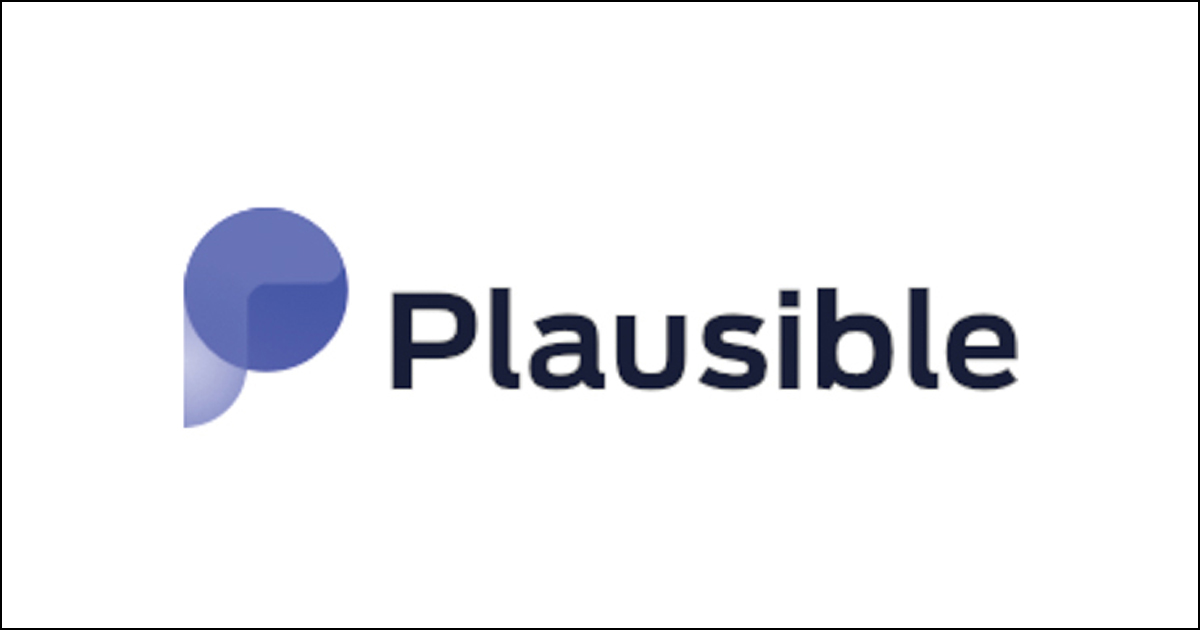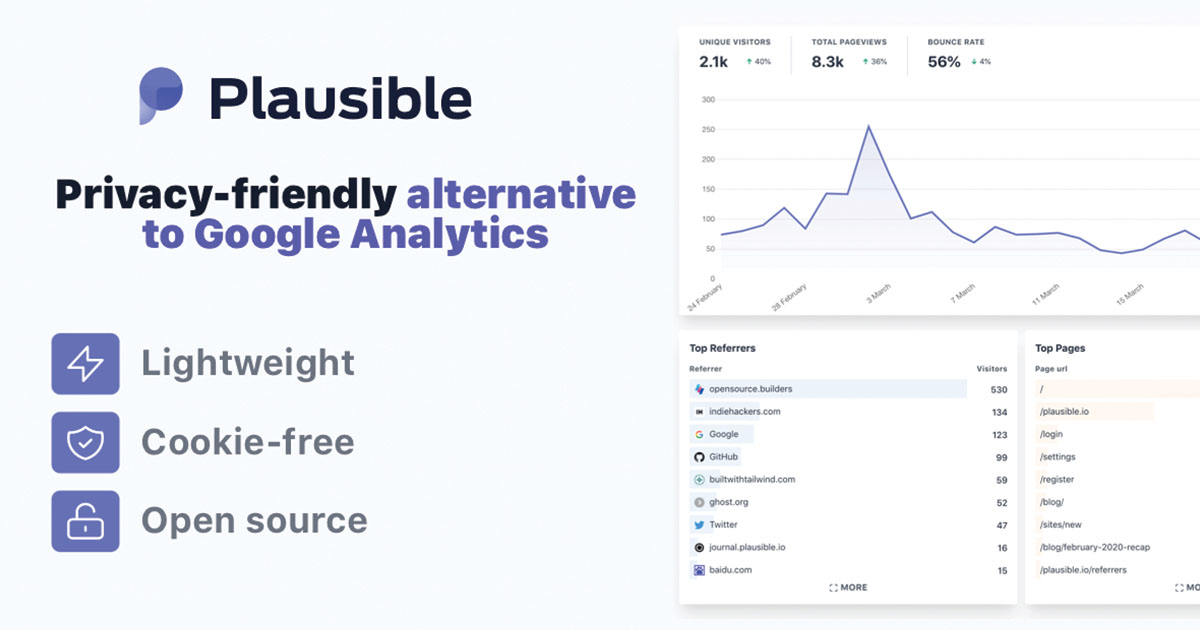Plausible Analytics Profile

Last Updated: By TRUiC Team
Plausible Analytics is a software-as-a-service (SaaS) startup that hosts an open source, privacy-centric web analytics platform.
Interview With Marko Saric
Describe your product or service:
“Plausible Analytics is a simple, open source, lightweight (< 1 KB), and privacy-friendly alternative to Google Analytics.”
Describe your company values and mission:
“Plausible Analytics is an open-source project dedicated to making web analytics more privacy-friendly. Our mission is to reduce corporate surveillance by providing an alternative web analytics tool which doesn’t come from the AdTech world.”
How are you funded? I.e. venture capital, angel investors, etc.
“Bootstrapped and self-funded.”
How big is your team? Tell us a little about them (I.e. co-founders, freelancers, etc.)
“Two co-founders and one part-time employee — plus help from the open-source community contributors.”
Did you always want to start your own business? What made you want to become an entrepreneur?
“This is the first time that I am a co-founder of a startup. I worked as an employee at other startups in the past. I had created some websites and different projects here and there but never started an actual company before. So, it's an exciting thing for us now as we're fairly new to the whole thing. We're learning as we go pretty much!”
How did you come up with your startup idea? How did you decide to actually act on the idea? What gave you confidence that you were on the right track?
“We’re a two-person team at Plausible. Both my co-founder Uku and I have had a similar journey with our opinion on and relationship with Google and their products.
I was a big fan of Google and their products for many years. I constantly used many of their services and was happy to recommend them to my family and friends. Somewhere along the way, Google got too big and it all turned from trying to improve the world into trying to squeeze more money at the cost of the privacy of their users.
So, I got more informed (or less ignorant) about the bad sides of Google and how Google affects the health and independence of the web. I started looking into better and more ethical alternatives to Google’s products and started sharing them on my website.
That’s how Uku found me and we got together to work on Plausible Analytics. There’s a need for better alternatives for all product lines where Google dominates. Analytics is just one of the problem areas, and this is the one we’ve picked because of our experience in the field. We both worked in tech and decided to work on Plausible full time to try and make it sustainable while living from our savings.
I’ve installed Google Analytics on countless websites over the years and spent many hours looking at its user interface and all the reports. So, I’m very familiar with its positives and its negatives too. It is a very confusing product to look at and to understand for many people unfamiliar with marketing and analytics.
People's feedback, the fact that they are using our product, and the fact that they are happy to remove Google Analytics to use Plausible and to pay us to use Plausible are all signals that we are on the right track.”
How did you come up with your company name? Did you have other names you considered?
“One of Uku's friends had the plausible.io domain name registered and it seemed like a good name, so we went for that one. There was no long consideration and too many alternative options.”
Feeling inspired? Learn how to launch your company with our guide on how to start a startup.
What is the greatest challenge you faced in starting your business, and how did you overcome it?
“Running, developing, and growing a startup in a competitive market, such as web analytics, is challenging. There are many other indie hacking projects, many established alternatives, and several major tech companies offering analytics too.
My co-founder Uku started developing Plausible and growing it on his own in December 2018. Just over a year into his journey, he decided that he needed some help in order to make Plausible sustainable and something that can become a viable project.
So, he reached out to me and we started working together. Uku could now focus completely on the design and development of the product, while I could take care of the marketing, community management, and customer support.
And with the two of us clearly focused on different but equally important tasks (development and marketing), we were able to make so much more progress than what anyone can do on their own.”
Who is your product or service made for? Who is your target market?
“Our target market is any website in the world. Pretty much every website has experience with Google Analytics, and we have an alternative to it. We are positioned directly against Google Analytics with a focus on some aspects where we think they’re not doing as well and where we think we might have a better solution for some site owners:
- Plausible Analytics is 45 times lighter than Google Analytics, so site owners can have a speedy and lightweight website.
- Plausible Analytics doesn’t use cookies and doesn’t collect any personal data, so there’s no need to bother your visitors with the cookie and/or the GDPR consent banners.
- Plausible Analytics is independent, open-source, and has nothing to do with ... surveillance capitalism.
- Plausible Analytics puts all our metrics on one simple to understand page while Google Analytics has hundreds of reports within hundreds of different menus.”
What's your marketing strategy?
“Our marketing strategy is product led and based on organic growth through word of mouth, social media, and content. We reject, exclude, and say no to the majority of the best marketing practices for growing a startup. We’re happy to say that it’s possible to grow while saying no to the business model of surveillance capitalism.
We focus on a small number of things, but we try to do them really well:
- Build a great product that people will recommend spontaneously. This is the key as without a great product nothing else would work.
- We stay active on Twitter, Mastodon, Indie Hackers, Hacker News, and to a lesser degree Reddit.
- We publish a lot of content.
My co-founder Uku has been building the product for about three years. I’ve been building the brand, content, and social presence for about a year and a half. Most of Uku’s time is writing code, and most of my time is writing content and interacting on social.
No tricks. Just putting one foot in front of the other every day and focusing on the marathon not the sprint. Sometimes people see our recent success and think that it came overnight. In reality, we have invested thousands of hours of coding and writing in getting to this point.”
How did you acquire your first 100 customers?
“Mostly through being active in the different startup communities such as Indie Hackers. We were regularly posting there about our work in progress — pretty much building everything in public. That's where the initial growth came from, the first beta users and the first paying customers too.”
What are the key customer metrics / unit economics / KPIs you pay attention to to monitor the health of your business?
“From the business side of things, we keep an eye on the number of paying subscribers and the monthly recurring revenue.
We also look at the total number of sites that are actively using Plausible and the total number of pageviews we are counting. Our job is to make sure our tracking and the different dashboards are up and loading fine at any time, so these are useful metrics to keep an eye on for monitoring purposes and server resource allocation.”
What's your favorite entrepreneurial book and podcast?
“My favorite startup book is ‘Rework’ by Jason Fried and David Heinemeier Hansson from Basecamp. I love their philosophy and the way they view startups, growth, business, and life in general.
Most of the lessons they share in the book are very unconventional and opposite of what you see and read in your average business, startup, or marketing book.
This book was valuable because it has helped me have the right mindset needed to do well at startups. It has helped me be more comfortable about looking at common advice critically, judging it, and being happy to say no to [most] things.
You don’t need to follow all the best practices and do all the things every book or blog post recommends. Do what you feel is right for your situation, and focus on a few selected things that you believe can make a difference for your startup.”
[Y]ou can try to become very good [at these things] at instead of spreading yourself too thin trying to tick all the boxes that the books and famous startup founders recommend.”
What is the biggest lesson you learned during your journey?
“One of my biggest lessons learned is about the importance of brand positioning. This is probably the biggest mistake I see when I visit sites made by other indie hackers. It’s something we worked on immediately when I joined Plausible as a co-founder, and it has made a tremendous impact.
Pretending that a popular competitor and a market leader doesn’t exist is something I’ve noticed many startups do. It’s a big mistake in my opinion.
Many times I enter a website of a startup and I immediately understand what they’re about and who they’re up against but this is nowhere to be seen on their site. In my head, I’m already comparing them to what I know about the other products on the market but they don’t try to help me in this process.
There’s no mention of that competitor at all and no clear positioning against the competitor. They’re not trying to help me figure out what differentiates them and what makes them better from the product that I’m already familiar with.
I believe that clear and upfront positioning of your product is the key if you want to grow in the early days. You need to tell your story straight away on your home page. You need to be honest and direct about how you compare to the big players in your market.
You need to make [what you do] crystal clear and easy to understand immediately, [declare] what you do, what you stand for, and how you compare to whoever is the biggest name in your market (such as Google Analytics is in our market).
People are familiar with the big name you are up against, so instead of pretending it doesn’t exist, help your visitors understand the difference. People are impatient, so if you don’t do that, chances are you lose that visitor.”
Who is your support system?
“My co-founder and I work well together. We have regular chats and calls in order to be on the same page and move Plausible forward. Other than that, I think it's important to be able to disconnect regularly in order to recharge and get back even more refreshed and stronger.”
How do you stay motivated?
“There's no better motivation for us than seeing an increasing number of sites removing Google Analytics and replacing it with Plausible Analytics. That's what motivates us and keeps us as excited about this journey today as when we started.”
Did you have to develop any habits that helped lead you to success? If so, what are they?
“One habit that helps us is the fact that we keep everything simple and take it one day at a time. It's not easy to be a bootstrapped startup and a team of only two people when having to deal with everything from product development, customer support, community management, marketing and so much more. So the fact that we can simply focus on the most important tasks and get down to work without getting lost and overwhelmed is really valuable and helps us make progress day to day.”
What are you most proud of as an entrepreneur?
“One cool thing that I’m proud of is the fact that as soon as Plausible became sustainable so we could pay some type of minimum salary to ourselves, we decided to create a little fund and give a bit back. So since the start of this year, we’re giving back 5% of our gross revenue to open source projects and environmental projects in order to ... help others take some steps toward sustainability. In the first 8 months of the year, our donation fund has grown to $10,801, and we’re looking forward to picking some of our favorite projects and giving back at some point early next year.
It’s funny that when I was researching about us doing this donation, people told me a move like this is “financially irresponsible.” I love the fact that because we don’t have investors and other shareholders, we can simply do what feels like the right thing to do whether it is financially responsible or not. And it feels great that a small, open source and privacy-first project run by two people can manage to allocate $10,000 in eight months and give it back.”
Recommended:
- Keep up with more startup companies by visiting our list of the top startups to watch.
- Hear startup stories from real founders on the Startup Savants podcast.
- Form your own startup by reading our review of the best online incorporation services.
Tell Us Your Startup Story
Are you a startup founder and want to share your entrepreneurial journey with our readers? Click below to contact us today!
More on Plausible Analytics

Insights From the Founder of SaaS Startup Plausible Analytics
We were fortunate enough to hear some valuable insights during our interview with Marko Saric of SaaS startup Plausible Analytics that will inspire, motivate, and teach aspiring and established entrepreneurs alike.

3 Ways to Support SaaS Startup Plausible Analytics
We have developed this list of three creative and impactful ways to support SaaS startup Plausible Analytics.


